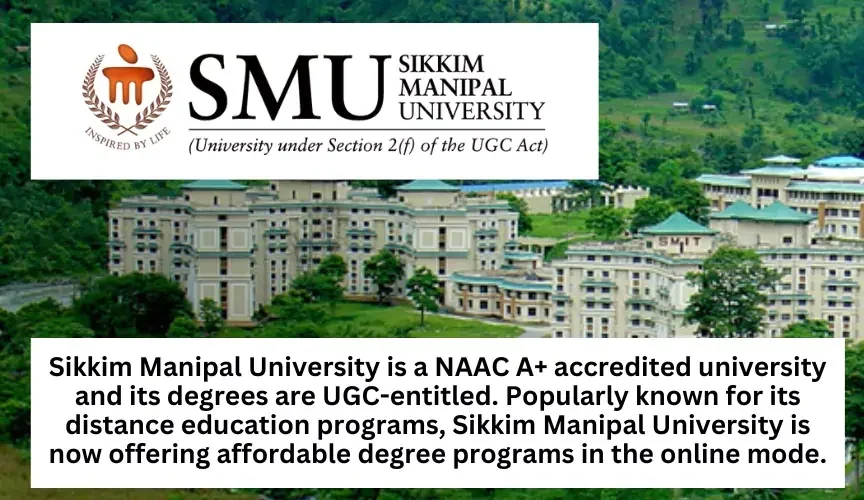UGC Announces Admissions in Two Academic Session 1st Batch(July/August) . 2nd Batch (January/February)
Get an Online MBA Degree by NAAC A++ Accredited Universities
Globally Recognised Universities
As per Govt. Online MBA Degree are Now Equivalent to Regular Degrees
Hurry Up! Admission Closing Soon. Only Few Seats Left. Enroll Now!
ODL & Online MBA Programs are Equivalent to Regular (Campus) Programs - To know more
UGC Announces Admissions in Two Academic Session 1st Batch(July/August) . 2nd Batch (January/February)
Get an Online MBA Degree by NAAC A++ Accredited Universities
Globally Recognised Universities
As per Govt. Online MBA Degree are Now Equivalent to Regular Degrees
Hurry Up! Admission Closing Soon. Only Few Seats Left. Enroll Now!
ODL & Online MBA Programs are Equivalent to Regular (Campus) Programs - To know more

10 Best Job-Oriented Short Term Courses Which are In-Demand
Job-Oriented Short Term Courses: Given its extensive curriculum and opportunity for job progression, Master of Business Administration (MBA) programs remain in great demand in the ever-changing field of business education. However as the business world changes so quickly, there is a growing need for specialized knowledge and abilities, which has led to the emergence of short-term courses that supplement regular MBA programs. In this space, we investigate the meaning, perks, and new developments around the transformational power of short-term MBA courses.
Evolution of MBA Education: Adapting to the Demands of Today’s Business Landscape

- A wide variety of business essentials, such as finance, marketing, operations, and strategy, are usually covered in the standard MBA program. Even while this foundation is vital, MBA students and professionals now need to look for extra specialized skills in order to stay competitive in the job market due to the changing demands of companies and industries.
- In order to meet this need, MBA short-term courses provide targeted instruction in specialized fields including data analytics, digital marketing, project management, and entrepreneurship.
- The goal of these courses is to give students real-world, hands-on learning experiences to supplement their theoretical knowledge. This way, students may quickly pick up important skills and use them in the workplace.
Assessment of Job-Oriented Short Term Courses: Aligning Learning Objectives with Industry Needs
- The business landscape has changed due to the rapid growth of technology, globalization, and shifting customer behavior. This has presented enterprises all over the world with new possibilities as well as problems. As a result, businesses in a variety of fields are looking for experts in fields including data science, cybersecurity, innovation, and sustainability.
- MBA short-term courses provide focused instruction on in-demand skills and new trends, bridging the gap between standard academic programs and industry demands. Enabling participants to remain ahead of the curve and make significant contributions to their businesses.
- These courses cover everything from grasping the nuances of market dynamics and regulatory frameworks to mastering the newest tools and technology.
Finest 10 Courses That You Can Opt For
- Financial Modeling and Revenue: This course gives you the tools to evaluate financial statements, build complex financial models, and assess a company’s worth. You’ll have the ability to precisely evaluate investment possibilities and project future success.
- Digital Marketing: Students will learn all the tools and strategies of digital marketing in this course, such as online advertising, social media marketing, search engine optimization (SEO), and search engine marketing (SEM). You’ll know how to make use of digital platforms to connect with target customers and expand your business.
- Data analytics: This online program will teach you how to use data to extract insightful information that can be used to make decisions for your company. You will become an expert in data visualization, data-driven problem-solving, and data analysis tools and approaches.
- Strategic Marketing Management: Market segmentation, brand management, product positioning, and pricing strategies are just a few of the advanced marketing techniques covered in this course. You’ll discover how to create thorough marketing strategies that complement business objectives and market conditions.
- Human Resource Management: This course will cover talent acquisition, performance management, employee engagement, and workforce development as well as the strategic function that HR plays in firms. You’ll discover how to promote a healthy workplace culture and match HR procedures with company goals.
- International Business Management: This course will provide you with an understanding of the intricacies involved in conducting business internationally, covering topics such as cross-cultural management, international trade laws, and methods for entering overseas markets. You’ll gain expertise in navigating the possibilities and difficulties associated with doing business in various foreign marketplaces.
- Management and Leadership Development: This course aims to help you become a better manager and leader. You will gain knowledge of strategic decision-making, effective communication, team building, and conflict resolution, all of which will position you for leadership positions in various organizational contexts.
- Supply Chain Management: You will have a thorough grasp of supply chain dynamics in this course, which covers demand forecasting, inventory management, procurement, and logistics. You’ll discover how to maximize supply chain operations to satisfy customers, maintain quality, and cut costs.
- Corporate Finance: The principles of corporate finance, such as capital budgeting, risk management, and capital structure choices, are covered in detail in this course. You will gain knowledge about how to analyze financial risks, assess investment prospects, and improve an organization’s financial performance.
- Risk Management: Prevention techniques, and company insurance options are covered in this course on risk management and insurance. To protect organizational assets and reputation, you’ll learn to recognize, assess, and manage a variety of hazards, including financial, operational, and strategic risks.
Enhancing Employability and Career Growth: Maximizing Opportunities Through Education
- Specialized skills: Through short-term courses, students may become subject matter experts and thought leaders in their disciplines by honing their specialized skills in certain areas of interest.
- Professional progression: Short-term courses that provide new skills and certifications can lead to chances for professional progression, such as wage increases, promotions, and access to leadership positions.
- Interaction Opportunities: Professionals from a variety of sectors and backgrounds come together for short-term courses, which fosters important networking that can result in partnerships, collaborations, and career connections.
- Application in the Actual Environment: A lot of short-term courses place a strong emphasis on experiential, hands-on learning, enabling students to apply their newly gained knowledge and abilities to opportunities and difficulties in the commercial world.
Recent Shifts in Short-Term Education: Adapting to Rapidly Evolving Industry Demands

- Internet access Transformation: Participants may learn how to navigate the digital economy and leverage technology to expand their organization by enrolling in courses that address topics like data analytics, artificial intelligence, blockchain, and digital marketing.
- Corporate Social Responsibility (CSR) and Longevity: Short-term courses in this field cover subjects including environmental management, social impact investment, and sustainable business practices, with a growing focus on sustainability and corporate social responsibility (CSR). These courses equip learners to tackle urgent global issues and provide value for stakeholders.
- Rapid and Innovation Thinking: These courses provide students with the mentality and skills they need to innovate, iterate, and adapt in quickly changing contexts. They also help firms develop a culture of innovation, teamwork, and ongoing development.
- Distance Education and Virtual Partnerships: The COVID-19 epidemic has prompted many short-term course providers to create online programs that allow participants to access top-notch education from anywhere in the world, accelerating the adoption of these technologies.
- Sector Collaborations and Business Training Schemes: To guarantee that the curriculum is in line with industry demands and trends, short-term courses are increasingly being produced in conjunction with industry partners and corporate sponsors. Corporate training initiatives give businesses the chance to upskill their staff members.
Conclusion
Short-term courses are essential to MBA education because they provide focused instruction in cutting-edge business-relevant skills and new trends. These courses enable participants to remain ahead of the curve, embrace new opportunities, and make significant contributions to their businesses and communities—whether it’s by leading sustainability efforts, embracing digital transformation, or mastering data analytics. Short-term courses will become increasingly important in MBA education as the need for specialized knowledge grows.
GET FREE COUNSELING













